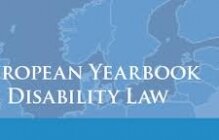incluD-ed at the Launch of the European Yearbook of Disability Law
Jue, 11/04/2013
incluD-ed attended the Launch of the European Yearbook of Disability Law taking place on April 9th at the European Parliament in Brussels, in order to assess the evolution of European policy for people with disabilities.
The launch was hosted by the MEPs Mairead McGuinness and Marian Harkin and attended by more than 60 participants among them Johan Ten Geuzendam (Head of Unit for Rights of Persons with Disabilities, DG Justice) and Immaculada Placencia-Porrero (Deputy Head of Unit, Unity for the Integration of People with Disabilities). The launch event is part of the Commission's drive to further inform and raise awareness of disability rights, laws and policies across Europe and within the EU Institutions.
The European Yearbook of Disability Law is part of the ongoing research program of the Maastricht Centre for Human Rights of Maastricht University and the Centre for Disability Law and Policy of the National University of Ireland Galway. It plays a key role in delivering accessible and informative material on disability rights in the EU, and aims to inform interested parties about European developments in disability law and policy. Volume 3 of the Yearbook, and its predecessors, are therefore essential reference tools for all stakeholders who wish to acquire an overview of the current status of laws and policies that effect persons with disabilities in the EU.
Marian Harkin outlined that with three volumes of the European Yearbook of Disability Law (available in electronic format) one can begin to analyse evolution and European policy across wide sectors. Together the 3 volumes provide accessible and informative law information. It is an invaluable resource for all stakeholders, allowing politicians to lobby for change. Marian Harkin said the “volumes should be required reading for all in the disability field”.
Keynote speaker Dr. Anna Lawson spoke about higher education as a powerful driver of economic growth and said that that Academia and research contributes in three ways:
1. Equipping students with relevant knowledge and skills and supporting them to gain experience;
2. Providing evidence about nature and existence of problem areas as well as ideas for possible solutions;
3. Engaging communities to contribute to promote Disability Laws and reforms.
These contributions can be enabled and enhanced by new funding schemes, the accessibility and availability of research and data and new collaborations - wwith disabled people’s organisations and other actors in Reform Processes.
Yannis Vardakastanis, President European Disability Forum, stated the Yearbook was a very important initiative which he was very pleased to support. He stressed the need to join forces for positive and dramatic change.
Professor Rannveig Traustadóttir, Director of the Centre for Disability Studies, University of Iceland, said that because of research we have come to understand disability in a different way. She spoke about learning from promising practices and the importance of learning from services identified by disabled people and their families as empowering and supportive. Disability scholarship must be for and with disabled people.
Professor Quinn, Director of the Centre for Disability Law and Policy, NUI Galway, talked about today’s situation and change through the democratic process and how research helps to make informed decisions. He touched on the sheer number of people living in institutions and how that needs to change as well as re-imaging a new social landscape. Economic and social models have failed. A search for a new economic model is required. Research can’t be disconnected from civic society. Research has to face the actual challenges faced by Europe and not the old idea of research for research’s sake.
It is interesting to see the new uses of research, to change ways future research can be done and that it actually shapes the social landscape. incluD-ed was amazed to assist in the event and to see how the research and the progress in Disability Law is supported by the EC and by the mix of social partners.
Furthermore, interesting documentation on disability law was accessed as well as concrete contacts were made with police officers, institutions and private companies specialised in disability law and interested in becoming part of the online incluD-ed community.
- EUROPEAN YEARBOOK OF DISABILITY LAW


















